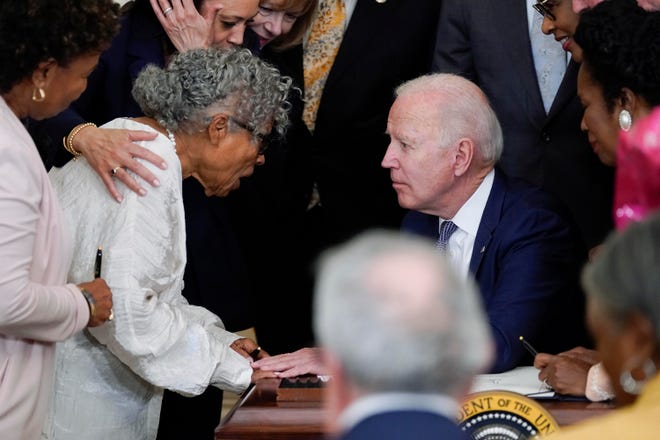
The Woman Who Helped Make Juneteenth a National Holiday
After spending a morning in April at her 13-acre farm, a food bank and a fundraiser for a Juneteenth museum, Opal Lee, 95, kicked off her shoes at her home in Fort Worth, Texas, and sat down to relax.
She joked that the house looks like a museum with nearly every inch of wall space adorned with family photos, awards and plaques she has won for her work turning Juneteenth from a backyard celebration into a nationally recognized holiday.
Lee, known as the Grandmother of Juneteenth, achieved her goal of making Juneteenth a federal holiday, but that doesn’t mean she is slowing down – as many who know her can attest. There’s more work to be done, she said, to use Juneteenth as an opportunity to educate, heal and solve many of the socioeconomic problems that disproportionately affect the Black community.
“None of us are free until we’re all free,” she told USA TODAY during a Zoom call. “Which means we have to keep working at getting rid of the disparities that are in our nation. … We need help.”
Juneteenth – also called Emancipation Day, Freedom Day or Jubilee Day – symbolizes the end of slavery, though it was not abolished until the 13th Amendment. The holiday commemorates the day in 1865 that Maj. Gen. Gordon Granger delivered the news of Abraham Lincoln’s Emancipation Proclamation to people in Galveston, Texas.
Lee has worked for the past five years campaigning to make Juneteenth a national holiday. Last year, she succeeded.

had been freed. Amanda McCoy/AP
When Lee was growing up in Marshall, Texas, the Juneteenth celebrations felt like Christmas, featuring music, speeches, games and food, she said. When she was 12 years old, a white mob burned down her family’s home in Fort Worth, forcing them to flee.
She sees Juneteenth as an opportunity to heal some of that trauma.
The celebrations can be healing for the country, too, as Black Americans recover from the trauma of police killings captured on camera, as well as the physical and emotional toll of racism.
The parties in Fort Worth were mostly family affairs until she helped organized one of the first major celebrations in the city – a three-day festival that drew more than 10,000 people each day in the 1970s – with the help of the Tarrant County Black Historical and Genealogical Society.
Texas became the first state to recognize Juneteenth as a holiday in 1980. About six years ago, Lee decided to bring Juneteenth out of Texas, so she walked from Fort Worth to Washington to put the holiday into the national spotlight.
As Lee often tells people, she thought “a little old lady in tennis shoes” might attract some attention. She was 89 at the time.
“She’s persistent,” said Bob Ray Sanders, a former journalist at the Fort Worth Star-Telegram and KERA-TV who has reported on Lee’s work since the 1970s. “She’s not afraid to ask for what she thinks she needs for the community that she serves. She’s just been a force.”
Though her campaign didn’t succeed during the Obama or Trump administrations, the holiday gained renewed attention in 2020 as Americans sought information about Black history amid nationwide protests that followed the death of George Floyd in the custody of Minneapolis police.
Lee held her annual walk about a month after Floyd’s death, and her petition to make Juneteenth a national holiday gained more than a million signatures. The next year, President Joe Biden made Lee’s dream a reality – designating June 19 a federal holiday in 2021. Hundreds of companies give employees the day off for Juneteenth.

Lee said she is “humbled” by the success of her campaign.
“Juneteenth as a holiday means a great deal to all of us,” she told USA TODAY. “It means perhaps that we have accomplished something.”
Deborah Evans, vice chair of the National Juneteenth Observance Foundation, has known Lee for about a decade and said she’s been “a tremendous influence” in getting the message out about the importance of June 19.
“I tell her all the time that when I grow up, I want to be just like her,” Evans said.
‘We’ve got work to do and plenty of it’
Lee has a host of issues she hopes to tackle in Fort Worth, in part through her urban farm, which employs people who were formerly incarcerated, and a community food bank, which organizers said helps feed hundreds of family each week.
Those projects are part of her decadeslong efforts to address hunger, housing insecurity, education and economic inequality as part of a number of organizations in her community. Lee’s long résumé of community service was documented in a letter signed by 33 members of Congress to nominate her for the 2022 Nobel Peace Prize.
“Homelessness, joblessness and climate change – all those things need to be addressed. We don’t have time to sit back,” she told USA TODAY. “We’ve got work to do and plenty of it.”
Sanders called her work in the community “an incredible accomplishment.”
“She’s just been a pillar of several organizations here,” he said.
Lee has helped “fill in gaps in the community,” said Marty Leonard, a board member of the water district who helped Lee acquire the land for her farm.
“She’s dynamic. She’s a one of a kind,” she said. “If it became necessary, she could move mountains.”

This year, Lee will lead her annual 2½ mile walk, attend a breakfast of prayer and watch the Miss Juneteenth pageant. Lee, who worked for years as an educator, said she wants to use the holiday as an opportunity for learning – particularly when legislators are moving to restrict lessons on racism in public schools.
She dreams of opening a Juneteenth museum in 2024 and seeing celebrations last “from the 19th of June to the Fourth of July.”
“Because we weren’t free on the Fourth of July,” she said. “And we still don’t have freedom.”
Image: Don Photography






